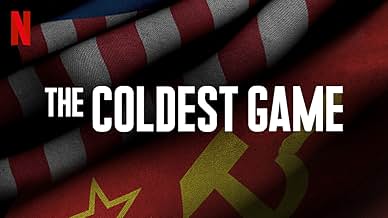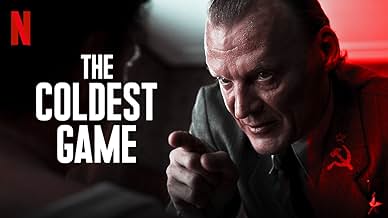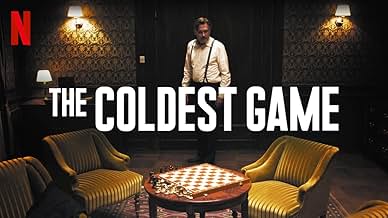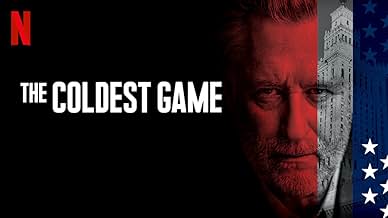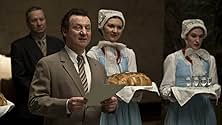NOTE IMDb
6,2/10
13 k
MA NOTE
Pendant la crise des missiles à Cuba en 1962, un génie des mathématiques en difficulté se retrouve enrôlé pour jouer dans un match d'échecs américano-soviétique - et un jeu d'espionnage mort... Tout lirePendant la crise des missiles à Cuba en 1962, un génie des mathématiques en difficulté se retrouve enrôlé pour jouer dans un match d'échecs américano-soviétique - et un jeu d'espionnage mortel.Pendant la crise des missiles à Cuba en 1962, un génie des mathématiques en difficulté se retrouve enrôlé pour jouer dans un match d'échecs américano-soviétique - et un jeu d'espionnage mortel.
- Réalisation
- Scénario
- Casting principal
- Récompenses
- 3 victoires et 13 nominations au total
Avis à la une
I watched this largely because it was pointed out to me by someone who knows I'm a big chess addict.
Clearly there are a lot of liberties taken here, kind of mixing the 1972 Fischer match with the 1962 Cuban situation, but I believe this artistic license was justified. Just do not go into the movie expecting historical accuracy in the chess sense. Reviewers who gave really bad reviews based on that are entirely missing the point.
A decent watch.
7.5
Clearly there are a lot of liberties taken here, kind of mixing the 1972 Fischer match with the 1962 Cuban situation, but I believe this artistic license was justified. Just do not go into the movie expecting historical accuracy in the chess sense. Reviewers who gave really bad reviews based on that are entirely missing the point.
A decent watch.
7.5
This is a captivating tale of the behind the scenes of a political chess match. Who would have thought there was so much going on behind a seemingly innocent series of chess games! It is a captivating story, with great acting as well. I really enjoyed it.
Decent enough thriller but as a previous review flagged their was some really irritating flaws in the parts of the film featuring chess. Firstly the idea of a player coming out of a 20 year retirement to challenge a top rated grandmaster is absurd. It is the equivalent of Mike Tyson trying to take on a fully trained Detoney Wilder on a days notice. Also the scene where Bill Pullman tries to remember the first game he mentions sacrificing a knight for a bishop? That is not a sacrifice it is an exchange, both are worth roughly the same although one can be better than the other depending on the position. I know it sounds really pedantic and nerdy but if you are going to make a film featuring a chess player as a main character at least pay for some basic research and make an effort to get it part right. Change sacrifice knight for bishop to rook for bishop and it us correct how hard is that??
This is a great and original spy thriller that cleverly knits together real historical events: the Cuba crisis, the Cold War and a politically laden chess match between a Russian and an American. But the film could have been much, much better if the writers had incorporated more realistic elements. As for other movies: fewer special effects, and more consultants (or a bit of Wikipedia), please...
To begin with, the narrative of the Cuba Crisis is outdated. The crisis had in fact been triggered by the earlier American deployment of nuclear SM-78 Jupiter missiles in Turkey, right on the border with the Soviet Union. The Soviets simply responded in kind to the aggression. And Kennedy did not 'stare down' Khruschev, saving the Free World. The crisis was resolved when he negotiated a then-secret treaty that included dismantling his Jupiters. Secrecy was important because Kennedy was very concerned with his re-election, and perhaps less so with annihilating the planet...
The chess match did indeed take place, but it was ten years after the crisis. Sadly, the movie gets few chess details right, even if many elements are indeed taken from the chess world. To begin with, top level players are not old men. These days, as in 1972, it is all healthy guys in their twenties. And you don't just come out of retirement for this; top players must constantly follow and study opening theory, and their opponents' repertoires and styles. Also, during such a match, top players have seconds, to help prepare games. Such a match could never have taken place behind the Iron Curtain; the 1972 Fischer-Spassky match was played in Reykjavík, Iceland. The movie also suggests that players move immediately after one another. This never happens, except in time trouble or during (very) obvious exchanges. When a player offers a draw, he may call an arbiter, not a "judge", and these offers are made after one has moved, not before. Players never, ever discuss the position during a game; you refuse a draw offer simply by making a move. There never are/were '15 minute breaks' in chess- the clocks just keep ticking. Games could be adjourned for the next day, where one player would secretely note down his next move in a sealed envelope that was kept by the arbiter. Finally, the chess talk in the movie is mostly nonsense- knights and bishops are equivalent pieces that are exchanged, is never a "sacrifice". Nonexistent gambits and other openings are cited.
What is true is that a world champ (Max Euwe) was a math teacher (not a professor), another had an alcohol problem (Aljechin) and players (Korchnoi, a dissident, playing Karpov) complained being 'hypnotized' by people in the audience. Also, in the famous 1972 match the paranoid and boorish (but brilliant) Bobby Fischer indeed failed to show up for (and forfeited) a game.
Perhaps more importantly, the movie's epilogue highlights the dangers of the nuclear arms race; the US and Russia have indeed recently torn up their treaty on intermediate missiles, following violations by the latter. Also, nuclear powers are obliged to reduce their nuclear arsenals, says the Nuclear Proloferation Treaty that many countries signed, but that is not quite happening while the SALT agreements are expiring ("do as we say, not as we do") making threats against rogue states that also want nuclear power (Iran, N-Korea) sound hollow.
To begin with, the narrative of the Cuba Crisis is outdated. The crisis had in fact been triggered by the earlier American deployment of nuclear SM-78 Jupiter missiles in Turkey, right on the border with the Soviet Union. The Soviets simply responded in kind to the aggression. And Kennedy did not 'stare down' Khruschev, saving the Free World. The crisis was resolved when he negotiated a then-secret treaty that included dismantling his Jupiters. Secrecy was important because Kennedy was very concerned with his re-election, and perhaps less so with annihilating the planet...
The chess match did indeed take place, but it was ten years after the crisis. Sadly, the movie gets few chess details right, even if many elements are indeed taken from the chess world. To begin with, top level players are not old men. These days, as in 1972, it is all healthy guys in their twenties. And you don't just come out of retirement for this; top players must constantly follow and study opening theory, and their opponents' repertoires and styles. Also, during such a match, top players have seconds, to help prepare games. Such a match could never have taken place behind the Iron Curtain; the 1972 Fischer-Spassky match was played in Reykjavík, Iceland. The movie also suggests that players move immediately after one another. This never happens, except in time trouble or during (very) obvious exchanges. When a player offers a draw, he may call an arbiter, not a "judge", and these offers are made after one has moved, not before. Players never, ever discuss the position during a game; you refuse a draw offer simply by making a move. There never are/were '15 minute breaks' in chess- the clocks just keep ticking. Games could be adjourned for the next day, where one player would secretely note down his next move in a sealed envelope that was kept by the arbiter. Finally, the chess talk in the movie is mostly nonsense- knights and bishops are equivalent pieces that are exchanged, is never a "sacrifice". Nonexistent gambits and other openings are cited.
What is true is that a world champ (Max Euwe) was a math teacher (not a professor), another had an alcohol problem (Aljechin) and players (Korchnoi, a dissident, playing Karpov) complained being 'hypnotized' by people in the audience. Also, in the famous 1972 match the paranoid and boorish (but brilliant) Bobby Fischer indeed failed to show up for (and forfeited) a game.
Perhaps more importantly, the movie's epilogue highlights the dangers of the nuclear arms race; the US and Russia have indeed recently torn up their treaty on intermediate missiles, following violations by the latter. Also, nuclear powers are obliged to reduce their nuclear arsenals, says the Nuclear Proloferation Treaty that many countries signed, but that is not quite happening while the SALT agreements are expiring ("do as we say, not as we do") making threats against rogue states that also want nuclear power (Iran, N-Korea) sound hollow.
As far as Netflix-produced movies go, this is one of the best I saw. At least, it has a script that actually makes some sense, albeit in a formulaic way. After all, this is the Cold War and we've pretty much seen everything about that period in time and movie rules (and history) dictate that the Russians are the villains and nobody is to be trusted.
In this movie, the story takes place mostly in Warsaw, which makes a nice change of place from the usual Berlin. A chess championship is taking place during the Cuban missiles crises and a drunkard American professor (Bill Pullman) must act as the go-between spy, besides being the chess champion defying Russia.
Pullman looks a lot like Dennis Hopper and does a good job as the brilliant, unstable genius. His handlers are three suspicious characters, one of whom must be a mole.
My favourite scene takes places in the men's lavatory and it is edited in such a way as to make you wonder what is going on. The previous scene established a character who may also not be what he looks like and the whole plot is directly linked to the opening scene.
Quite enjoyable and suitably gritty, even if I usually don't enjoy movies where the main character is an addict.
In this movie, the story takes place mostly in Warsaw, which makes a nice change of place from the usual Berlin. A chess championship is taking place during the Cuban missiles crises and a drunkard American professor (Bill Pullman) must act as the go-between spy, besides being the chess champion defying Russia.
Pullman looks a lot like Dennis Hopper and does a good job as the brilliant, unstable genius. His handlers are three suspicious characters, one of whom must be a mole.
My favourite scene takes places in the men's lavatory and it is edited in such a way as to make you wonder what is going on. The previous scene established a character who may also not be what he looks like and the whole plot is directly linked to the opening scene.
Quite enjoyable and suitably gritty, even if I usually don't enjoy movies where the main character is an addict.
Le saviez-vous
- AnecdotesLead actor William Hurt broke his leg in an off-set accident a few days after filming started. The injury was so bad that he had to be replaced by actor Bill Pullman.
- GaffesThe American flag is displayed improperly on the wall during the chess match. According to US flag etiquette, the blue star field should always be displayed in the upper left hand corner when the flag is hung on a wall.
- Citations
Agent Stone: God protects children, drunks, and the United States, as they say.
- Bandes originalesZagubiona rozmowa
Music by Milosz Wosko
Performed by Przemyslaw Florczak, Sebastian Frankiewicz, Robert Murakowski, Maciej Szczycinski & Milosz Wosko
Meilleurs choix
Connectez-vous pour évaluer et suivre la liste de favoris afin de recevoir des recommandations personnalisées
- How long is The Coldest Game?Alimenté par Alexa
Détails
- Durée
- 1h 42min(102 min)
- Couleur
- Mixage
- Rapport de forme
- 2.39 : 1
Contribuer à cette page
Suggérer une modification ou ajouter du contenu manquant

![Regarder Trailer [OV]](https://m.media-amazon.com/images/M/MV5BNTViYjYyZjYtOTI1NS00NzhhLTg3MDEtZGUxOTM3Mjc2OGU0XkEyXkFqcGdeQXRyYW5zY29kZS13b3JrZmxvdw@@._V1_QL75_UX500_CR0)
